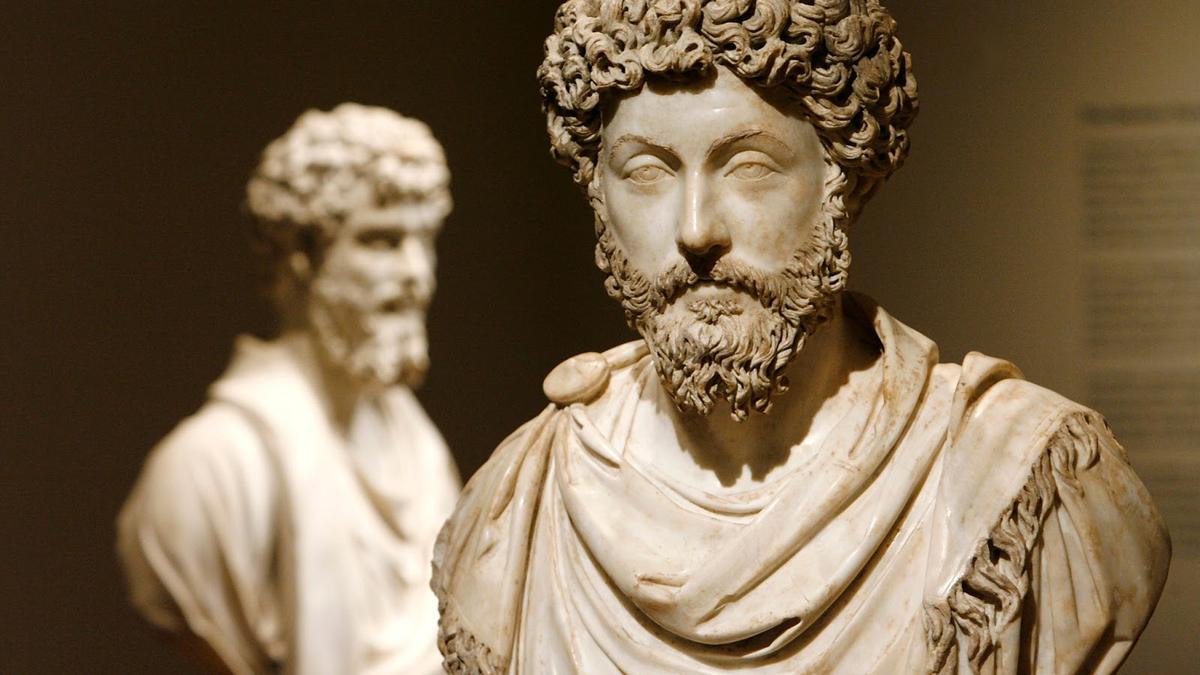Ephemeral, meaning lasting for a very short time. A word that has been recently going viral for being said by actor Joju George in the Malayalam movie Narayaneente Moonnaanmakkal. Before diving into a philosophical idea like Stoicism, it is important to understand certain words similar to the one above.
Stoicism emerged in Athens during a period of great philosophical exploration. Zeno of Citium, influenced by Socrates and the Cynics, developed Stoic philosophy to cultivate virtue and achieve tranquillity in an unpredictable world. The Stoics believed that true happiness (eudaimonia) is achieved through rationality and virtue, rather than external circumstances. The philosophy later gained prominence in Rome, embraced by figures such as Seneca, Epictetus, and Emperor Marcus Aurelius. These philosophers further developed Stoicism, making it more accessible and applicable to governance, personal development, and ethical decision-making. The Stoic school flourished for centuries and left a lasting intellectual legacy.

““Everything we hear is an opinion, not a fact. Everything we see is a perspective, not the truth.””Marcus Aurelius
One of the key ideas in Stoicism is distinguishing between what is within our control and what is not. Epictetus, a former slave-turned-stoic philosopher, emphasised that individuals should focus only on their thoughts, actions, and choices while accepting external events with equanimity. This perspective fosters emotional resilience by reducing anxiety over uncontrollable circumstances.
Stoicism teaches that the highest good in life is virtue, which consists of four cardinal qualities: wisdom, courage, justice, and temperance. Unlike material wealth or pleasure, which are transient and unreliable, virtue is seen as the only true source of lasting fulfilment. By cultivating virtuous character, individuals can maintain inner peace regardless of external events.
Stoics believe that living in harmony with nature means accepting the natural order of the universe and embracing rational thought. This principle encourages individuals to align their actions with reason and moral integrity, rather than being swayed by desires and emotions.

A major stoic exercise is negative visualisation or premeditatio malorum, in which individuals contemplate potential misfortunes to build psychological resilience. By imagining worst-case scenarios, one can prepare emotionally and appreciate the present moment, reducing fear and fostering gratitude for what one has. The philosophy also places significant emphasis on the awareness of death, known as memento mori. By acknowledging the inevitability of death, individuals can live more purposefully and avoid wasting time on trivial concerns.
Some of the stoic main characters
1. Zeno of Citium (c. 334–262 BCE)

Zeno founded the Stoic school in Athens, laying the groundwork for Stoic doctrines. His teachings emphasised rationality, virtue, and self-discipline as the means to attain a tranquil life. Though few of his writings survive, his influence is evident in later Stoic works.
2. Seneca (c. 4 BCE–65 CE)

Seneca, a Roman statesman and playwright, provided practical insights into Stoicism through his essays and letters. His works, such as Letters to Lucilius, explore themes of resilience, ethical living, and overcoming adversity. Seneca’s writings remain highly influential, particularly in the realms of personal growth and leadership.
3. Epictetus (c. 55–135 CE)

Epictetus, born a slave, became one of the most respected Stoic philosophers. His teachings, compiled in Discourses and The Enchiridion, emphasise the importance of focusing on what we can control and cultivating an unshakeable inner life. His philosophy is deeply pragmatic and accessible to people from all walks of life.
4. Marcus Aurelius (121–180 CE)

Roman emperor, Marcus Aurelius, applied Stoic principles to governance and personal conduct. His meditations: a series of personal reflections, offer profound insights into maintaining wisdom, patience, and humility in the face of adversity. His writings serve as a timeless guide for leaders and individuals seeking inner peace.
Stoicism in the modern world
Despite originating over two thousand years ago, Stoicism remains profoundly relevant in today’s world. Many individuals turn to Stoic principles to navigate personal and professional challenges, cultivate resilience, and achieve greater fulfilment. It helps with coping with adversity, mental health and wellbeing, while leading to influencing lifestyles like minimalism and slow living.
Many leaders draw inspiration from Stoic philosophy to make ethical and rational decisions. By prioritising virtue over personal gain and remaining composed under pressure, Stoic principles promote effective leadership. The teachings of Marcus Aurelius are often referenced in business, politics, and military strategy.
It also offers practical strategies for improving mental well-being. Practices such as negative visualisation and memento mori encourage individuals to appreciate life and build resilience against anxiety and depression. Even cognitive behavioural therapy (CBT), a widely used psychological approach, is influenced by Stoic techniques in managing negative thoughts.
In an age driven by consumerism, Stoicism advocates for simplicity and detachment from material possessions. By valuing character and wisdom over wealth and status, individuals can find deeper contentment and reduce the pressures of modern society.
A timeless philosophy, Stoicism provides a roadmap for living a virtuous and resilient life. Through principles such as the dichotomy of control, the pursuit of virtue, and the acceptance of nature’s order, Stoicism equips individuals with the tools to navigate adversity with wisdom and grace. The teachings of Zeno, Seneca, Epictetus, and Marcus Aurelius continue to inspire people across cultures and professions. In a world filled with uncertainty and challenges, the Stoic approach offers a powerful framework for achieving inner peace and moral excellence.
Published – April 18, 2025 05:04 pm IST
